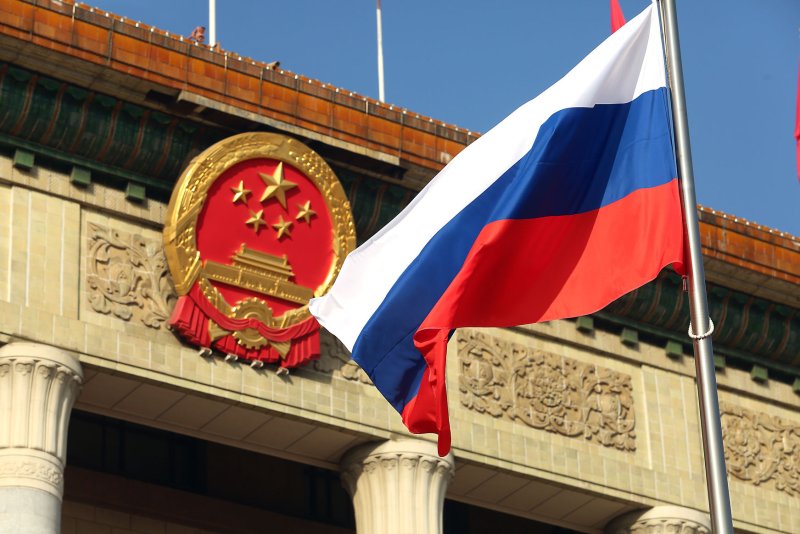The Russian flag is seen at the Great Hall of the People in Beijing, China. Both nations are being considered for inclusion on the United Nations Human Rights Council, despite what critics say have been questionable human rights records. File Photo by Stephen Shaver/UPI |
License Photo
Oct. 13 (UPI) -- The United Nations General Assembly elected Russia, China and Cuba to the Human Rights Council on Tuesday, attracting staunch criticism from the United States which accused those nations of being some of the worst violators.
By secret ballot on Tuesday, the 193-member assembly elected 15 countries to join the 47-nation member Human Rights Council, filling seats in the five regions of Africa, Asia-Pacific, Eastern Europe, Latin America-Caribbean and Western Europe for a three-year rotation starting Jan. 1, 2021
Russia and Cuba ran unopposed while Saudia Arabia lost in a five-nation contest for four spots in the Asia region with Pakistan, Nepal and Uzbekistan.
China, meanwhile re-gained its seat by only 139 votes, the lowest of the 15 victorious countries and a significant drop from the 180 votes it won in 2016.
U.S. Secretary of State Mike Pompeo lambasted the council over its selection of China, Russia and Cuba, saying it only further validates the U.S. decision in 2018 to withdraw from the governmental body.
"Today, the U.N. General Assembly once again elected countries with abhorrent human rights records, including China, Russia and Cuba," the United States' top diplomat said in a statement, adding that "the United States' commitment to human rights consists of far more than just words."
Russia hadn't been part of the Eastern European group since 2016, while China and Saudi Arabia were part of the Asia-Pacific group that served from 2017 through 2019.
The United States, which has wavered multiple times in the past about maintaining a seat on the HRC, withdrew in 2018 under President Donald Trump, accusing the council of being "hypocritical and self-serving."
Many in the human rights community have complained about China's treatment of the Uygur Muslim-minority population in its northwestern Xinjiang region, among other purported abuses.
Russia is under scrutiny over the recent poisoning of opposition leader Alexei Navalny, the 2018 poisoning of a former spy and his adult daughter and its 2014 annexation of Crimea from Ukraine.
Saudi Arabia is under suspicion for the death of dissident writer Jamal Khashoggi, a frequent critic of the Saudi royal family. Khashoggi was killed and dismembered in Turkey in 2018, but his body has not been recovered.
Human Rights Watch Director Louis Charbonneau called on the general assembly prior to the vote to rethink its consideration of the nations.
"Serial rights abusers should not be rewarded with seats on the Human Rights Council," Charbonneau said.
Hillel Neuer, executive director of the watchdog group UN Watch, bristled at the fact that China, Russia and Saudi Arabia were being considered.
"When these dictatorships win election to the U.N.'s highest human rights body -- with the complicity of our leaders who refused to say a word -- which victims of their persecution will you be thinking about? Let's use this moral outrage to shine a spotlight on their victims," Neuer tweeted.
UN Watch is the only U.N.-accredited watchdog.
"'The situation is equivalent of allowing five convicted arsonists to join the fire brigade,'' the group added.
Following the election on Tuesday, Neuer tweeted that Tuesday was "a black day for human rights.
"The inmates are running the asylum," he said.















